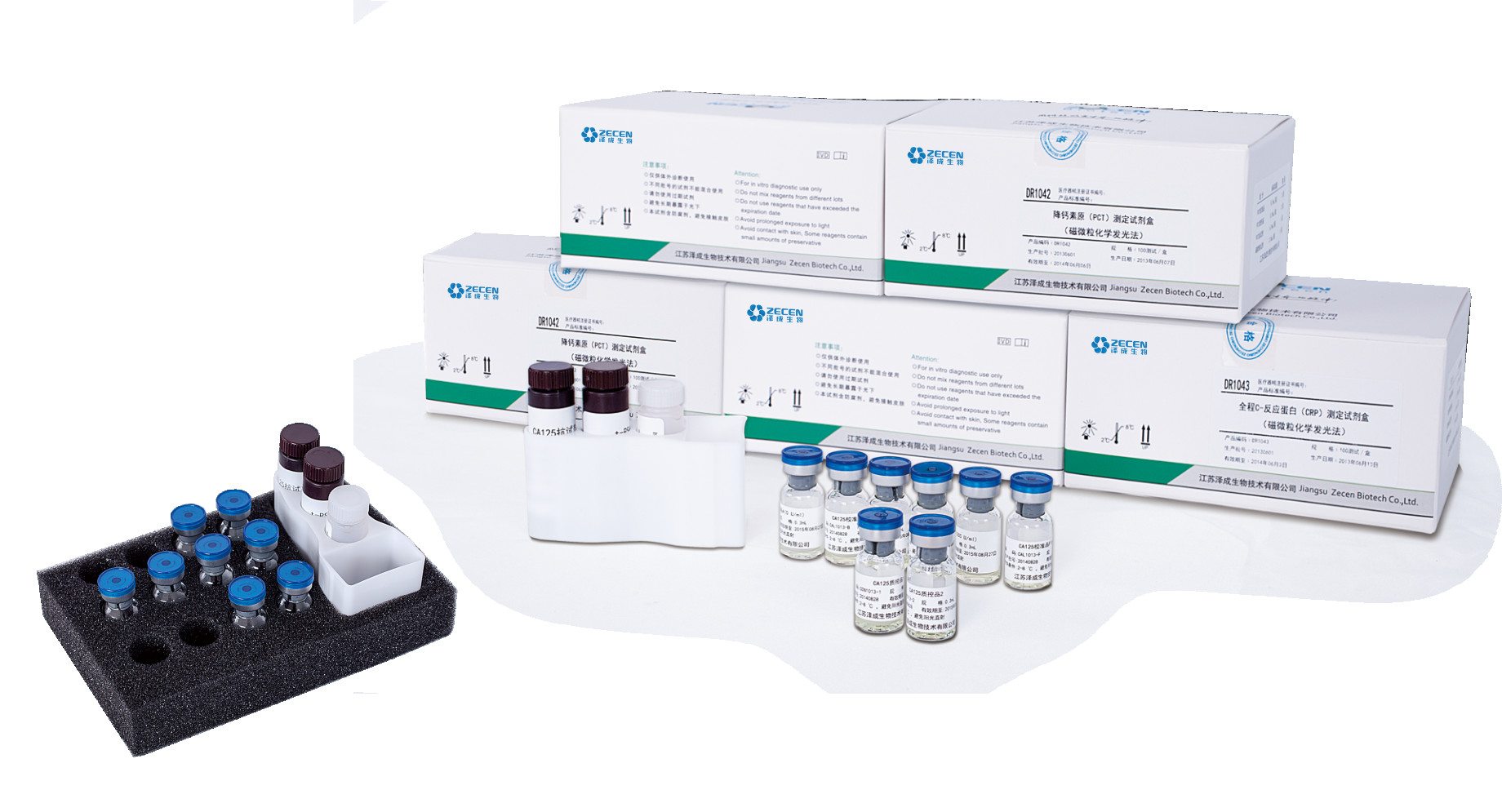Taizhou Zecen Biotech Co.,Ltd. |
|
Glycometabolism & Hypophyseal Hormone Test Kit for Chemiluminescence Immunoassay Analyzer C-P INS
C-peptide(C-P)
(1) Determination of C-peptide concentration is helpful for the clinical classification of diabetes and helps to understand the islet function of patients.
(2) Because C-peptide is not interfered by islet antibodies, the concentration of C-peptide can be directly measured in patients receiving insulin therapy to judge the patient's islet function.
(3) The cause of hypoglycemia can be identified. If the C-peptide exceeds normal, it can be considered to be caused by excessive insulin secretion; if the C-peptide value is lower than normal, it is caused by other reasons.
(4) The determination of C-peptide is helpful for the diagnosis of islet cell tumor and the judgment of the effect of insulinoma surgery. The level of C-peptide in the blood of insulinoma is high. If the level of C-peptide in the blood is still high after surgery, it means that there is residual tumor tissue. During follow-up, the level of C-peptide continued to rise, suggesting the possibility of tumor recurrence or metastasis.
Insulin (INS)
1. Determine whether a diabetic patient is a type 1 patient or a type 2 patient, and determine the function of β cells.
2. Monitor serum insulin levels so that doctors can determine the correct treatment plan.
3. It is mainly suitable for patients without insulin treatment. It can be measured by drawing blood on an empty stomach and 2 hours after a meal, and the postprandial level should be 4-5 times higher than that on an empty stomach. If the insulin level is significantly reduced, it is called an absolute deficiency, which can be seen in type 1 diabetes; if there is no significant reduction, but the blood sugar rises, it is called a relative deficiency, because there is a malfunction in the link where insulin works, which is often seen in Type 2 diabetes with insulin resistance.
| Glycometabolism & Hypophyseal Hormone | C-P | C-Peptide (C-P) is a linking peptide connecting insulin A chain and
B chain in the proinsulin molecule. It consists of 31 amino acid
residues to form a linking peptide with a molecular weight of 3021.
Proinsulin is cleaved in the pancreas by proteases and
carboxypeptidases to generate one molecule of insulin and one
molecule of C-peptide. C-peptide has no biological activity, is co-stored with insulin in secretory granules, and is released from pancreatic islet B cells to the blood in an equimolar ratio together with insulin under the stimulation of glucose. Substances that stimulate or inhibit insulin secretion also stimulate C-peptide secretion. Under physiological conditions, C-peptide is mainly excreted by the kidneys. Insulin in circulating blood is partially inactivated in the liver, so the measured plasma insulin cannot accurately reflect the secretion state of pancreatic islet B cells. Since C-peptide is produced in the process of insulin synthesis, its quantity has a parallel relationship with the secretion of insulin, and C-peptide antibodies do not cross-react with insulin, are not affected by exogenous insulin, and are hardly absorbed and absorbed by the liver. Metabolism, the half-life is more than 2 times longer than that of insulin, so the detection of serum C-peptide level can accurately reflect the secretory function of pancreatic islet B cells, and it is not affected by the production of insulin antibodies in the body after long-term insulin injection. |
| INS | For in vitro quantitative detection of insulin (INS) in human
serum. The role of INS in the body is very extensive, mainly to
lower blood sugar, and once it is lacking or cannot function
normally. use, it will cause diabetes. It is the only hormone in the body that lowers blood sugar, which can promote sugar uptake in muscle and adipose tissue, promote glycogen synthesis, and inhibit glycogen decomposition; it is also the only hormone in the body that simultaneously promotes the synthesis of glycogen, fat and protein. |




